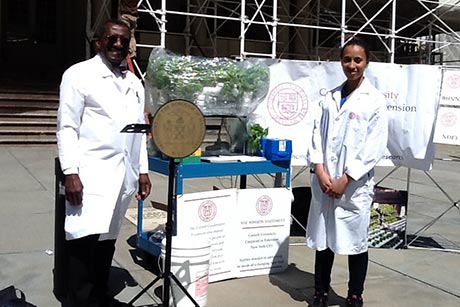Cornell seeds urban farming in the Big Apple

Partnering with Manhattan borough president Gale Brewer, Cornell Cooperative Extension-New York City (CUCE-NYC) will help to sow innovative urban agriculture projects in Big Apple schools, senior centers and public housing facilities during the next year.
Flanked by leaders from CUCE-NYC and Manhattan’s Food and Finance High School (FFHS), a Cornell partner school, Brewer announced up to $1 million in borough funds for urban farming projects at a press conference April 30 on the steps of New York City Hall. Noting the great potential to increase food quality, improve residents’ health and enhance economic growth, Brewer released a report, “How Our Gardens Grow: Strategies for Expanding Urban Agriculture,” touting Manhattan’s strengths as a leader in city gardening.
“Our rooftops, schools and senior centers aren’t the first places that come to mind when you think of agriculture, but Manhattan is home to an array of urban plots, hydroponic farms, greenhouses and more than 170 community gardens,” Brewer said. “Urban agriculture yields tremendous benefits for our neighborhoods, our economy and the environment. It teaches valuable skills and produces fresh, healthy, locally grown food.”
At the event, CUCE-NYC extension associate Philson Warner and FFHS junior Christa Torres demonstrated a mobile hydroponic farming unit, part of the school’s Hydroponics, Aquaculture and Aquaponics Learning Labs, where Torres and classmates learn cutting-edge techniques for growing vegetables, raising fish and other urban farming methods.
Warner has developed a 40-unit Hydroponic Learning Model curriculum to teach students the New York State Regents “Living Environment” curriculum through experience. Student interns serve as technicians, working in a laboratory setting and supplementing classroom lessons with hands-on work.
“Our hydroponics technology quickly and cleanly produces high-quality fresh vegetables, but it also produces a better quality of learning for the students who work with it,” Warner said. “It’s a joy to help students learn STEM (science, technology, engineering and mathematics) lessons through this experiential, inquiry-based, project-focused curriculum.”
Jennifer Tiffany, CUCE-NYC executive director and director of outreach and community engagement for the Bronfenbrenner Center for Translational Research, described the Cornell-FFHS partnership as a model for urban farming programs that support youth development and STEM education.
“Our school-based hydroponics and aquaponics programs will play a key role in the expansion of urban agriculture envisioned by borough President Brewer,” said Tiffany, who was joined by FFHS principal Roger Turgeon at the event. “We already engage hundreds of New York City youth each year in experiential learning about science and entrepreneurship while supplying schools and local communities with high-quality produce – many varieties of lettuce, herbs and Chinese cabbage – as well as fresh fish.”
To share knowledge and plant the seeds for a boroughwide agricultural support network, Brewer and CUCE-NYC are planning an Urban Farming Symposium in Manhattan this fall to bring together city farmers and Cornell experts.
Media Contact
Get Cornell news delivered right to your inbox.
Subscribe